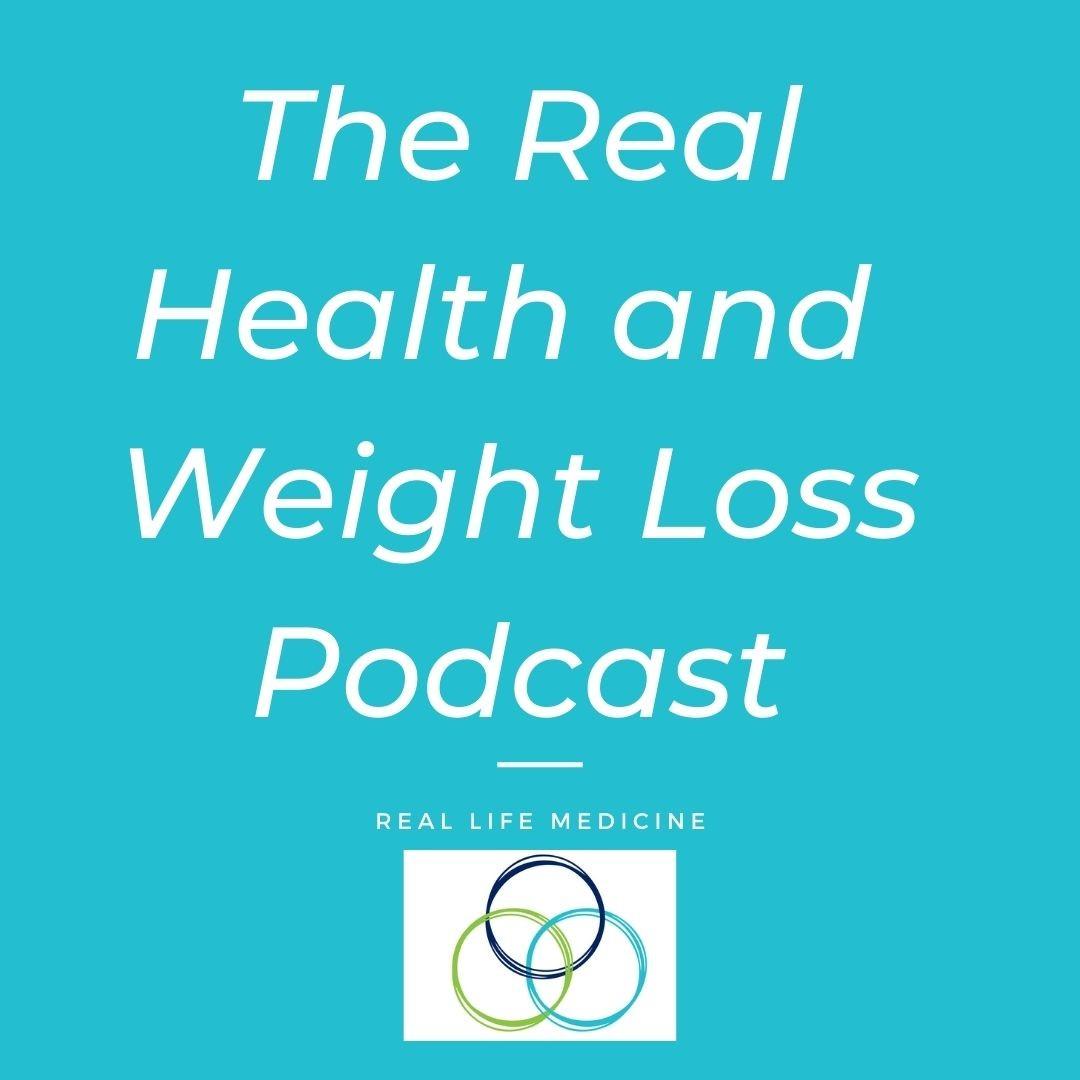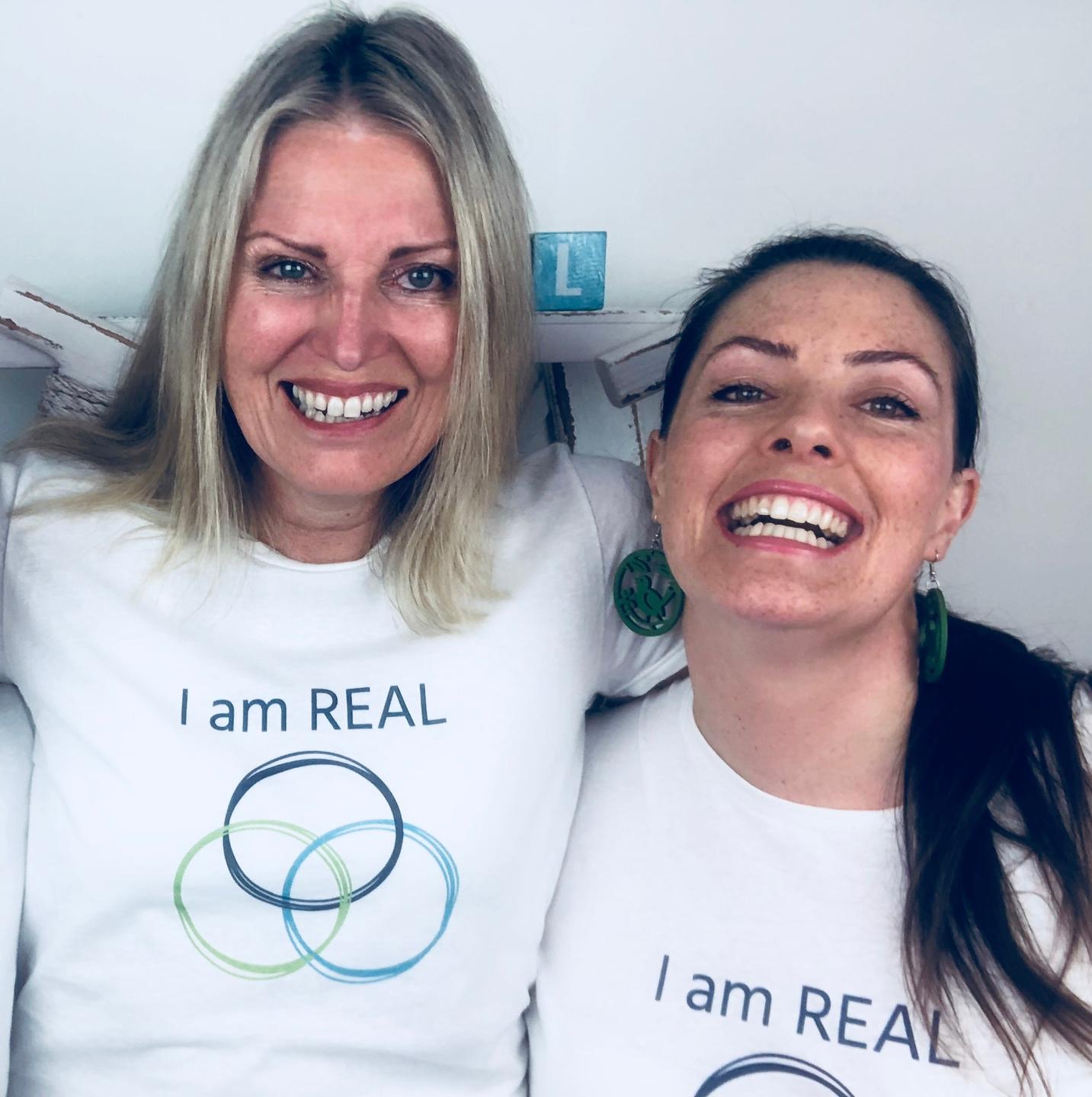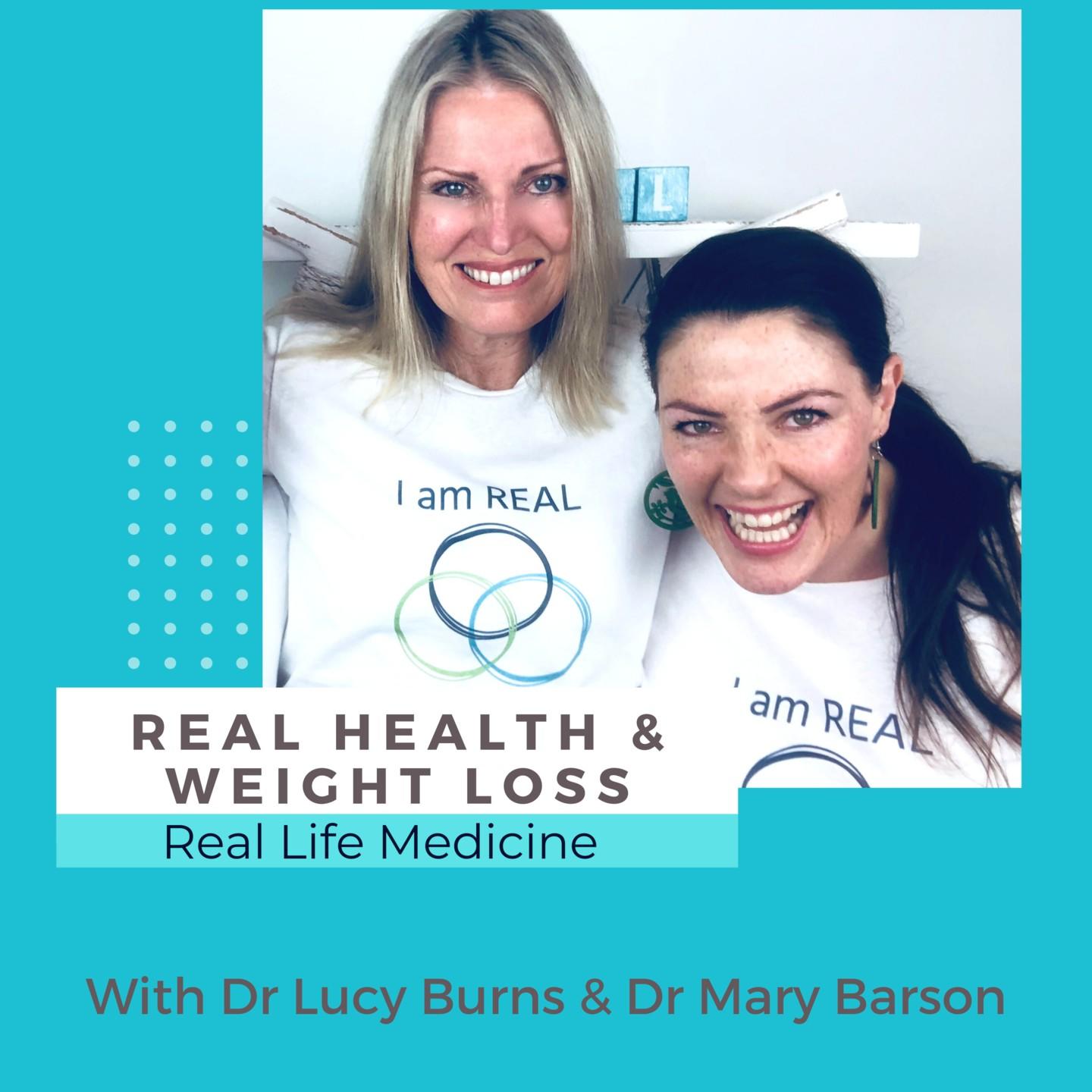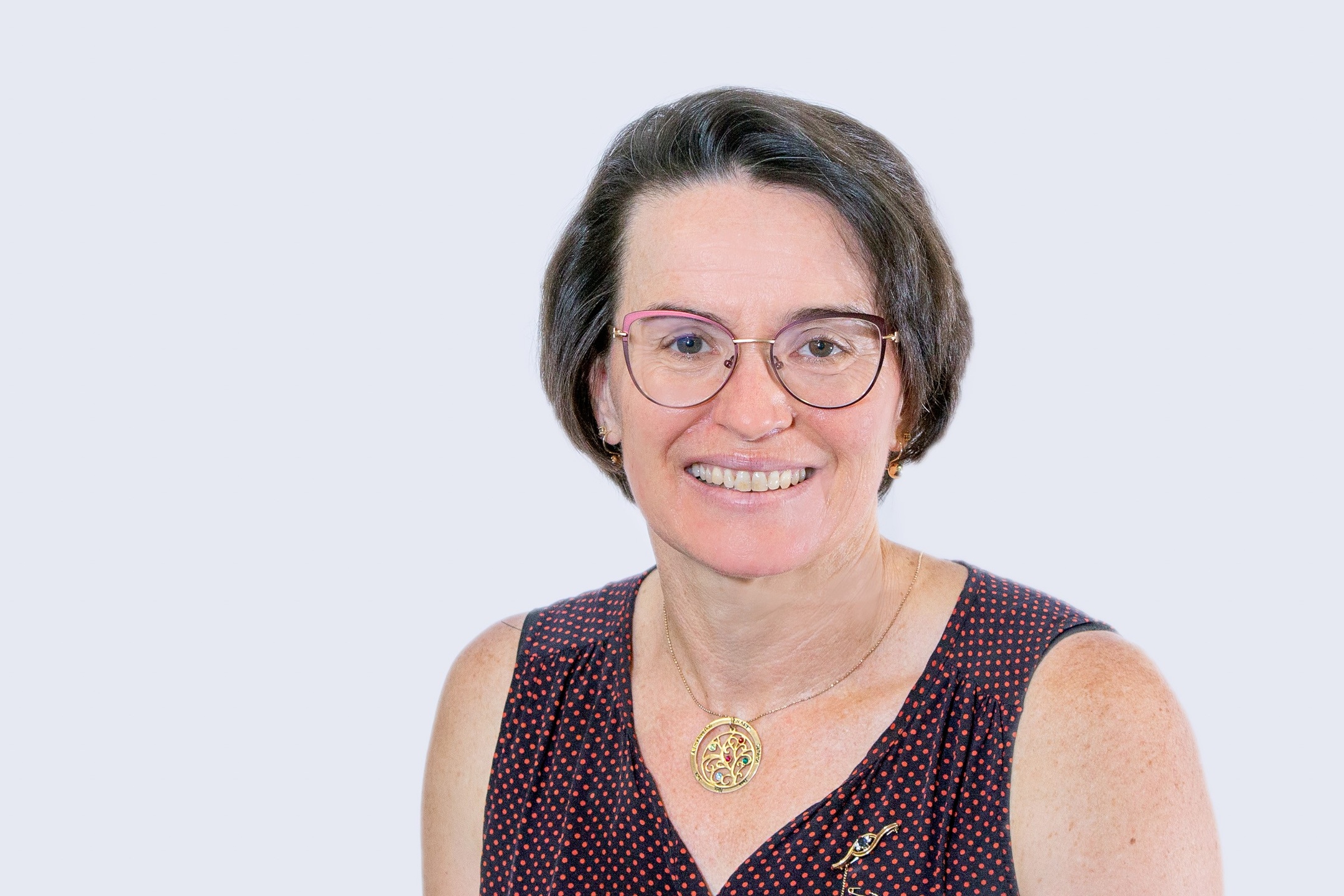



Episode Thirty Eight
Dr Karen Dwyer
Karen is a kidney and transplant specialist. In 2020 she completed FASLM and has a specific interest in improving the metabolic health of people with kidney disease and high blood pressure through lifestyle measures. Karen is Professor of Medicine at Deakin University and Clinical Director of Kidney Health Australia.
Twitter: @KarenDwyer12

Show Notes
Does salt cause high blood pressure?
Dr Mary Barson: Hello, my lovely listeners. I'm Dr. Mary Barson.
Dr Lucy Burns: And I'm Dr. Lucy Burns. Welcome to this episode of Real Health and Weight Loss. Good morning, lovely listeners. It's Dr. Lucy here this morning. I am without my beautiful colleague, Mary, because today I have a special guest for us to interview and I'm super excited to welcome Dr. Karen Dwyer to the podcast. Karen is a nephrologist, which is a kidney doctor. And Karen is the clinical director of Kidney Health Australia. Welcome to the podcast, Karen. I'm super excited to talk to you today.
Dr Karen Dwyer: Oh, thanks, Lucy. I'm super excited to be here.
Dr Lucy Burns: Wonderful. So we - Karen and I - connected when Karen reached out to Mary and I and asked us to do a presentation for the medical students at Deakin, which we were so excited about because getting this message out to our younger doctors in training is one of our passions. So Karen, what I'd like to ask you, because low carb is not in the normal, traditional sphere of medical doctors at the moment. So tell me, how did you come across it?
Dr Karen Dwyer: Thanks, Lucy. So I've been interested over the last few years in low carb as an approach to managing yet another chronic disease, which is chronic kidney disease, a disease that is increasing in prevalence fairly rapidly. And in parallel really with what we're seeing with type two diabetes and hypertension and obesity. And it became really clear to me that what I was doing was really a band aid approach. I was trying to manage blood pressure with tablets, and then more tablets or I was trying to manage diabetes by changing medications there. And underneath that the root cause of it we really weren't addressing. And the difficulty there is that with renal disease, once you've got some kidney disease, it tends to be progressive. And there are lots of complications that arise, in particular heart complications. And those band aid fixes weren't really helping my particular patients, which were the patients with chronic kidney disease. And there are a lot of similarities with all the other chronic diseases. It's very well established that patients with kidney disease are insulin resistant and have hyperinsulinemia. And therefore that just started to make sense to me that really what I needed to do was move upstream and start to think about the cause. And that was the insulin resistance.
Dr Lucy Burns: I love that I completely agree. I mean, I think one of the most unsatisfying aspects of medicine is the band-aid approach where we just prescribe medications, which, look, sometimes they're appropriate. Absolutely. But without having any understanding of the root cause it really makes for really unsatisfying medicine. So I love the idea that you were looking upstream for the cause.
Dr Karen Dwyer: Yeah, so, you know, obviously renal disease or kidney disease is a consequence of something else, an insult that's happened. There can be some genetic causes. But most commonly, in the world, and particularly, certainly in Australia, diabetes is the most common cause of kidney disease. Hypertension, and obesity are other risk factors. Smoking, if you've got concurrent vascular disease, all those things are risk factors. So it really is, it's like when you have fallen over and you’ve scraped your knee, you get a scar and the scar is in the kidney. So we have to prevent that scar. So we do need to move upstream. And I think that needs to be where the emphasis needs to shift. To early detection and then prevent that progression. Because once you've got established kidney disease, and certainly when you've, if it progresses to kidney failure, it really does impact you personally and for the community as a whole. It's a very expensive treatment, and it's got a lot of complications.
Dr Lucy Burns: Absolutely. And I think sometimes people don't necessarily realise that, you know, treating kidney failure with dialysis is an incredibly time intensive process. And really, you know, reduces your quality of life amazingly. And not just your quality but your family’s for people around you and things like that.
Dr Karen Dwyer: For sure the impact is so significant, and as I say to people, it's not one like taking a pill. This is a complete change, your life will change completely, it will be very time consuming. I sort of say to people, kind of imagine walking in concrete. You're not as good as if you've got a functioning kidney. And so you're always battling. When you're on something like dialysis, it's not a treatment that I would wish for anybody.
Dr Lucy Burns: No. So prevention, this is a case of obviously, prevention is better than cure. And I think probably, certainly, when I went through medical school, the idea was, “Oh well, if we treat the high blood pressure, and we treat the sugars, then that will prevent the kidney disease”. But it's actually a step even further back than that isn't it?
Dr Karen Dwyer: Ah, definitely. So things like blood pressure control, and there are certain blood pressure tablets that we've used for many years now that are useful, and there's some newer diabetes medications that are coming out that are particularly useful. But what they do is they may slow but they don't prevent that progression. So the critical thing is to try and get in as early as possible to treat the root cause, what's causing it. And then hopefully, there will be some prevention. And there is some interesting literature to show that perhaps that you can get an improvement in kidney function. And I think that just shows how resilient our bodies are and how we can repair things that we thought in the past, you couldn't repair, you potentially can repair.
Dr Lucy Burns: Every now and then I just have these little sort of wafts of amazement. And I think Mary and I did an episode earlier about how to love your liver, because I have this, you know, incredible respect now for that powerhouse of an organ. But the kidneys are the same. They are incredible organs. And we were lucky to have two. But when they fail, yeah, the effects are catastrophic.
Dr Karen Dwyer: Yeah, they are catastrophic, because I think one important thing to state is that, yeah, we do have two kidneys. But you can lose just about all that kidney function until you start to feel sick. So this is another reason this is a really silent disease. And that if you've got risk factors for kidney disease, it's really important to be proactive, because you might get that window of opportunity to know what's going on, and then potentially reverse things.
Dr Lucy Burns: So I think that's a good point. What are the signs of kidney disease? How would somebody know if their kidneys are struggling?
Dr Karen Dwyer: So by the time you know, if your kidneys are struggling, we're very late in the disease process. So really, you can lose up to 90% of your kidney function before you might develop some symptoms. And when you do develop those symptoms, sometimes they're very, very nonspecific, and quite vague. And they could be things like feeling very tired, being off your food, not being able to concentrate. Sometimes there might be some swelling in the legs and feeling a little bit short of breath, for example, but we do know that there's a sort of defined set of risk factors. And that's what we would encourage people to really focus on. Am I at risk? If I'm at risk, go to my GP and get my kidneys checked. If my kidneys are okay, then I'm fine for a couple of years. If there's a problem, then we can get in, try to reverse, certainly prevent further progression, and then treat any complications that might arise.
Dr Lucy Burns: So for our listeners who are listening, what would those risk factors be? What would they be looking out for?
Dr Karen Dwyer: Yeah, so they're very common risk factors. So diabetes, as I mentioned before, if you've got diabetes, that's a huge risk factor for kidney disease. If you've got high blood pressure, another risk factor for kidney disease. If you're a smoker, if you've got established other heart disease, if you've ever had a heart attack, that would be a warning sign. If you are carrying excess weight, that's a risk factor for kidney disease. Unfortunately, just getting a bit older is also a risk factor. And we suggest starting to screen for kidney disease at age 60. and above. And I liken this to a little bit of wear and tear that is similar to our joints, they get a bit of wear and tear. So it wouldn't be unreasonable to think that our kidneys might get some wear and tear, again, doesn't mean to say that there's nothing that we can do about it, but it's worth getting checked. And then I think it's also just important to really flag that the burden of disease in indigenous and Torres Strait Islander populations is extremely high. And so although in non indigenous populations, we would recommend screening at age 60 or above, in an indigenous person a lot earlier.
Dr Lucy Burns: I think that just goes hand in hand with the knowledge that we have that indigenous and Torres Strait Islander people are also more at risk of metabolic health disease. the effects of sugar, and refined carbohydrates on their body are just so much more prevalent than perhaps people who have Anglo Saxon heritage.
Dr Karen Dwyer: Yeah, correct and very high burden of diabetes and of renal disease. So yeah,
Dr Lucy Burns: Yep. So you know, the thing that I love, right is that we can get a lot of bang for our buck going on a low carb lifestyle. Basically, we can reverse our obesity, fix our blood pressure, decrease or reverse diabetes, certainly decrease the effects of diabetes and improve vascular health. It's almost a no brainer about going low carb.
Dr Karen Dwyer: I agree. The list is endless. And I think we can put obstructive sleep apnea in there. We can put hypertension. We can put mental health, polycystic ovary syndrome and until recently, I wasn't, I wasn't sure about chronic kidney disease. But there is emerging literature to show that this may be really important not only for slowing, but reversing chronic kidney disease. It becomes very complex, because there's lots of dietary considerations with kidney disease, such as protein and potassium, and all sorts of things, but I think if we keep it simple, then low carb will be probably ideal for someone with kidney disease as well.
Dr Lucy Burns: That's wonderful. I think real food, low carb, or low carb, real food, as we like to call it, is just one of my mantras. So I know it comes up a lot. And particularly when people are first transitioning, perhaps from a highly processed food diet onto low carb, there's a lot of talk about salt. And I think people get worried if they've had high blood pressure as well. You know, what are your thoughts on managing salt on a low carb lifestyle?
Dr Karen Dwyer: So it's pretty clear that with carbohydrate, it acts on the kidney and makes you retain some fluid. And there's lots of reports of people transitioning to low carb and really having very rapid weight loss to begin with and a lot of that is fluid that's been removed. And if you're going to lose a lot of fluids, you're going to lose a lot of salt with it. So it wouldn't be surprising that you will need to have some salt to replace. If you've got hypertension, and there's varying degrees of hypertension, and there are various causes of hypertension, it can become a little bit more complicated. If we think about the majority of people who have what we call essential hypertension, probably a lot of those people have what we consider essential hypertension, but they probably are insulin resistant, which is what's driving their hypertension. So they should really respond very nicely to dropping carbohydrates, therefore dropping their insulin levels.
There is a cohort of people that have very salt sensitive hypertension. So if they have salt, then that will drive their blood pressure up. And so they are a group that we do need to be more mindful of their salt consumption. But I think for the majority of people, it's fair to say that the more carbohydrate that you are ingesting, the more fluid that you will retain. And a really simple thing to remember is that fluid drives blood pressure. So if you're, if you go into a hospital and your blood pressure's low, the first thing that will happen is that you'll be given lots of fluid, because fluid we know will push up your blood pressure. So if we want to bring down your blood pressure, we need to pull off that fluid. And the best way to pull that off is not having things to retain it because we don't want medication to have to fight against carbohydrate retaining fluid. So that's been a real realisation for me over the last few years, that the drop in blood pressure associated with low carb can be quite striking. And I think there's probably lots of reasons for it. There's the associated drop in weight and we know with the drop in weight, you will drop your blood pressure, but there's probably an independent effect, which is really very much at the blood vessel level, which is the impact of carbohydrate on the blood vessels.
Dr Lucy Burns: Yes, I think what happens maybe in medical school, too, so I mean, I went through medical school last millennium, it was quite a long time ago. Right before we had this sort of obesity epidemic, it was much less common to see obesity, certainly metabolic syndrome. It wasn't even called that, it was called syndrome X because we didn't really know what it was, this sort of new emerging sort of collection of signs. So, the people that did have high blood pressure back then were less likely to be insulin resistant, they were often still lean and they just had what we call essential which is really just a fancy name for “we don't really know why you've got it”, blood pressure. But over the last 40 years that picture has completely changed and now we just have the majority of people with blood pressure. It's metabolically driven, due to our favourite hormone! Insulin!
Dr Karen Dwyer: Yeah, yeah. And the scary thing is that it's still not recognised or appreciated. And that's something that we do need to get that education at the medical school level that actually, the days of saying 95% is essential, well, actually, within that essential, let's put a significant proportion have insulin resistance. So it's a much bigger component of secondary causes. Yeah.
Dr Lucy Burns: Well, I love that you're championing the cause, because you're managing to, you know, you're doing it at a medical student level. And now in your role at Kidney Health Australia, like that's massive! That's going to be brilliant. I'm super excited about that. And for all the people that have kidney disease, be it mild, moderate, or severe, you know, it's so wonderful that you will be there kind of advocating lifestyle change.
Dr Karen Dwyer: Yeah, it's a very exciting time to be at Kidney Health Australia. And the real mission of the organisation at the moment is, that early detection, so making, ensuring people are aware of what the risk factors are for kidney disease, because it is silent. So you may not know that you have any concerns with the kidney, and really encouraging people to speak to their doctor about it. Have a test, which is very simple, understand whether there is the presence or absence of kidney disease, and then really engaging with the community so that we can look at ways to prevent, and potentially reverse kidney disease.
Dr Lucy Burns: That's so exciting. Can I just ask you? You mentioned, “Have a test, it's pretty simple”. What tests would people be expecting to have?
Dr Karen Dwyer: The test to look for kidney disease, there's really, there's three arms to it. One is a blood test where we look at your kidney function through the blood, so it's a biochemical marker that gives us the percent of how your kidneys are functioning. The second test is a urine test, where we look to see if you're leaking any protein from the kidney. And that is just a spot urine test that you do. And then the third test is having your blood pressure checked. So it's, we’re not very fancy with kidney medicine. It's pretty simple. It's a blood test, a urine test and a blood pressure check. So easy to do. Results come back quite quickly and the consequences of that can be quite profound.
Dr Lucy Burns: Yes, absolutely. I love it! Karen, I think that you know, we've got a few as we call them, the, you know, the low carb crusaders who are actually making a difference for individuals. You're doing it both at a one to one level within your consultations, but then also at a health policy level. And that's so exciting to hear.
Dr Karen Dwyer: Yeah, it's a very exciting time, Lucy to be involved, with our mantra at the moment being “early detection of kidney disease to prevent progression” and hopefully reverse any kidney disease that might be present. And I think we've got some really, really exciting opportunities to just tighten up some of our guidelines that we have at the moment. So for example, in lifestyle interventions for kidney disease, the guidelines currently say to reduce refined carbohydrates and sugary drinks, and I'd like to get that wording changed to avoid, because I think that they're directly impacting on someone's kidney disease. And, you know, we don't want people to smoke and we don't want people to have sugar when they've got some underlying issues such as kidney disease.
Dr Lucy Burns: Yeah. And I think it's tricky, isn't it? You can see a lot of marketing messages that are promoted currently, particularly for refined sugar and sugary drinks, use very similar tactics to the way smoking advertising used to be. We've managed to have that completely regulated, which is wonderful. But certainly, regulation of advertising of junk food is a long way away, I think, at this stage. You were telling me about the effect of food in hospitals and I think that that's something that's really, really important and so disconnected to what we're trying to do for people.
Dr Karen Dwyer: Yeah and I think this is a real challenge. And this is I think the work that James Muecke has been doing. The Australian of the Year from last year. It is so critically important. And as he said, until we can get those guidelines changed at a national level, so that they can be filtered down, the food that then is fed to the people in hospital, our kids at school. People in prisons. At daycare. It is all going to be based on what is a nonsense pyramid with a lot of carbohydrate heavy food. And I think the other really striking thing is even if you do look at that pyramid, it was designed for a healthy population. And by definition, if you're in hospital, the majority of people aren't going to be healthy. There'll be a small minority that are perhaps having a baby or some other elective type of procedure, but most people are in there because they're unwell. And it might be a relatively minor, they might be recovering from an appendectomy, for example, but if you want your skin to heal, and heal in a timely manner without infection, then we don't feed it, you know, a carbohydrate rich diet. So, you know, I think that's just such critical work that he's doing to really change those guidelines.
Dr Lucy Burns: Yes, he is a phenomenal help in this, I guess, you know, it's the battle of getting the guidelines changed. Because, you know, at the heart of it, most doctors, I'd like to say all doctors want their patients to get well. That's our core sort of philosophy and I think that we just need to go back to that. Really basic roots of good nutrition, good sleep, you know, social connections and exercise, and managing stress. And they're the foundations. And in hospital, nobody gets that.
Dr Karen Dwyer: No, no, and the amount of money we spend in hospitals on fancy drugs, fancy procedures, all sorts of really amazing scientific work that's been done. But I think we have lost sight of the fundamentals, the real basics of you've got to get the nutrition, right. And those other aspects, otherwise these things won't work. So it's wasted money and wasted time.
Dr Lucy Burns: Yeah, absolutely. Karen, it has been a delight to talk to you today. I'm so excited to have again, you know, a physician, a kidney specialist, somebody else on board who is really going down or upstream, downstream, whichever way you like to look at it to look at the root cause of what is basically causing this tsunami of chronic disease we have coming our way. And hopefully, our politicians will listen because at the end of the day, if we, as a society, don't do something about it, it will bankrupt Medicare, It will be the most expensive thing we have to try and repair. And as they say, “Prevention is better than cure”.
Dr Karen Dwyer: Yeah, we really do have to have to shift the focus and invest in that prevention, don't we? Yeah.
Dr Lucy Burns: Yeah. Absolutely. Absolutely. All right, lovely listeners. That's it for us this week. And Mary and I will be back next week with another episode of something exciting. Have a wonderful day, and we will chat again soon.
So my lovely listeners that ends this episode of real health and weight loss. I'm Dr. Lucy Burns.
Dr Mary Barson: And I'm Dr. Mary Barson. We’re from Real Life Medicine. To contact us, please visit rlmedicine.com
Dr Lucy Burns: And until next time, thanks for listening.







